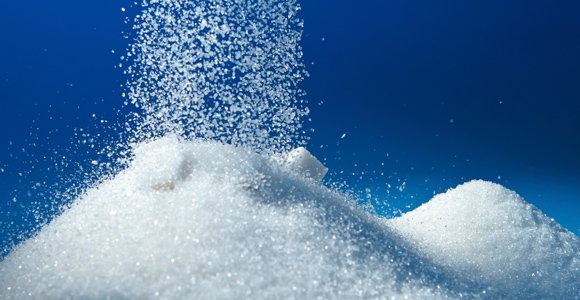When reading an ingredients label for sweet foods, such as cookies, ice cream or gum, you may see terms such as: sorbitol, mannitol, maltitol, hydrogenated starch hydrolysate and xylitol. These words may sound like chemical compounds that should not be found in food but they are actually commonly seen sugar alcohols. All are made from cornstarch, except xylitol which comes from varied sources such as corn, sugar cane or birch wood.
Sugar alcohols are essentially a sugar substitute and are frequently found in foods labeled with "sugar free" or "no sugar added." In order to replace sucrose (i.e. sugar), many sugar free foods instead add sugar alcohols, an alternate compound that is not as sweet and has fewer calories. Contrary to its name, sugar alcohols are not real alcohols; the name is derived from their chemical makeup which includes a hydroxyl group (-OH), an organic compound found in alcohols.
In comparison to artificial sugars, such as aspartame, which are manufactured from other chemicals, sugar alcohols are derived from natural compounds that are found in foods. The amount of sugar and calories varies according to the type of sugar alcohol. Sorbitol, for example, can be found naturally in some fruit, but is typically made from dextrose, and has about 2.6 calories per gram, tasting 60% as sweet as sucrose. Mannitol is more widely found in fresh fruit and vegetables, such as strawberries and pumpkins, but is commercially made from fructose. Similar to sorbitol, mannitol is also 60% as sweet as sucrose, but has only 1.6 calories per gram. Almost all of the common sugar alcohols are half as sweet as sugar, except xylitol, which has a taste as sweet as sucrose (sugar). Foods that contain xylitol are usually gums, candies and vitamins, due to its minty flavor.
What does all of this mean for your diet? If you choose foods with sugar alcohols, they will have fewer calories per serving which may help you lose weight. They also may have fewer carbohydrates, which may be beneficial if you are diabetic and trying to control your blood glucose. Low calorie sweeteners can be used for coffee or tea, thus helping you reduce caloric intake without sacrificing the taste. Some sweeteners can also be substituted for regular sugar in recipes.
In sum, learn to recognize sugar alcohols in foods that claim to be sugar free. Remember that all sugar alcohols are derived from naturally occurring compounds, compared to artificial sweeteners which contain compounds that are not normally found in nature. Also, be careful when buying foods that are sugar free, since a lot of foods compensate for flavor by increasing fat.
Rhea Li is a Registered Dietitian who received her Bachelor's degree in Nutrition and Master's degree in Public Health from the University of Texas. She has a special interest in working with children and has received her certification in pediatric weight management. Currently, she is working on a research study to determine the importance of nutrition in pediatric cancer patients. In the past, she has worked with pregnant women and their children. In her spare time, she enjoys being with family, exercising, traveling and of course, eating.



